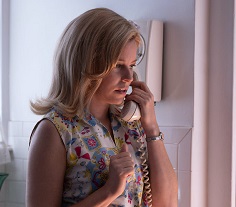Call Jane
 Joy is a suburban Chicago housewife in 1968, with an attorney husband and a 15-year-old daughter, who somewhat unexpectedly finds herself pregnant. Due to a medical complication, Joy is given just a 50-50 chance of surviving the pregnancy. Unfortunately, Joy’s doctor won’t authorize an emergency abortion. Remember, this is five years before the U.S. Supreme Court acknowledged women’s right to abortion via the Roe v. Wade decision, and abortions were still illegal in most states. Joy and her husband Will go before the hospital board, comprised of a group of older, white, male doctors and administrators, who reject Joy’s appeal for an emergency procedure, citing the fact that she still has a 50% of living.
Joy is a suburban Chicago housewife in 1968, with an attorney husband and a 15-year-old daughter, who somewhat unexpectedly finds herself pregnant. Due to a medical complication, Joy is given just a 50-50 chance of surviving the pregnancy. Unfortunately, Joy’s doctor won’t authorize an emergency abortion. Remember, this is five years before the U.S. Supreme Court acknowledged women’s right to abortion via the Roe v. Wade decision, and abortions were still illegal in most states. Joy and her husband Will go before the hospital board, comprised of a group of older, white, male doctors and administrators, who reject Joy’s appeal for an emergency procedure, citing the fact that she still has a 50% of living.
At her wit’s end, Joy calls a number she sees on a flyer in downtown Chicago. This puts her in touch with The Janes (sometimes known as the Jane Collective), which was a real group offering underground abortions to women in need. Jane is picked up by a volunteer, driven to a ragtag apartment in a seedy neighborhood, and without any screening process, is ushered to a room where a young, seemingly inexperienced doctor performs the procedure and terminates Joy’s pregnancy.
Powerful new film
This is the premise for “Call Jane,” a strikingly powerful new film from Phyllis Nagy, who wrote the screenplay for Todd Haynes’ 2015 release “Carol.” What’s powerful about “Call Jane” is the lead performance of Elizabeth Banks, an actress who has made a career (so far) of appearing in mainstream pictures. This is her meatiest role, and she nails it with a pitch-perfect portrayal of a 1960s housewife who must make the most difficult decision of her life. Banks’ Joy doesn’t come off as dumb; she even helps her lawyer husband write his closing arguments. But she does possess that pre-women’s-lib naivete, which makes her bold move that much more dramatic.
Interesting timing
What also makes “Call Jane” powerful is its timing. Through no fault of its own, “Call Jane” (which was filmed in spring of 2021) just so happens to hit theatres following the Supreme Court’s surprising reversal of Roe v. Wade. While many states, including Indiana, scramble to make abortion illegal again, “Call Jane” reminds us of the battles fought by women two generations ago, which now seem for naught. The fact that Nagy, and screenwriters Hayley Schore and Roshan Sethi, present “Call Jane” in perhaps the least political manner possible is a testament to the care taken to stick to the facts of the story without waxing on about the current political climate. There is but one mention of Richard Nixon winning the 1968 presidential election, but without commentary from any of the players. It’s spoken more to give the film a timing anchor.
 Volunteer spirit
Volunteer spirit
Soon, Joy finds herself volunteering for The Janes, transporting other women to the apartment for abortions. As she begins to take on a more active role with the group, her husband Will (Chris Messina) and daughter Charlotte (newcomer Grace Edwards) find themselves eating more TV dinners (in the time before microwave ovens), and spending more time alone. In the film’s only misstep, Will confides in his widowed next-door neighbor Lana (Kate Mara), perhaps a little too much, regarding his loneliness.
Sigourney Weaver
In an odd bit of casting, Sigourney Weaver plays Virginia, the leader of The Janes. It’s odd because Virginia is a lifelong radical. A former beatnik, Virginia is too old to be considered a hippie, but the type to devote herself to any cause she deems worthwhile. I’ve written many times that Weaver, who was so strong in this year’s “The Good House,” can play anything, but this does seem somewhat outside her previous repertoire of uptight professionals and suburbanites.
The Janes are funded by the mob, and they’re at the mercy of whatever Doctor Dean (Cory Michael Smith) wants to charge, and all payments must be made in cash. But they survive based on their desire to help other women. One of the women is even a nun, which is a bit strange, considering the Catholic church’s stance on abortion.
Worthiness aside
An excellent plot point is that not all the women who come to The Janes for assistant are “worthy” of the procedure – at least in Joy’s eyes. Chief among these undeserving women is a girl whose boss continues to make her pregnant, and then pay for her abortions. The girl considers her abortions nothing more than a way to continue to remain in the good graces of her superior. I’m glad Nagy and her screenwriters didn’t dodge this issue. While it’s true that many women found themselves in Joy’s dire situation, others simply used the Roe v. Wade ruling to have sex.
Screaming to be seen
Again, for an issue so rife with political overtones, “Call Jane” is unabashedly apolitical. And it’s this political distance that makes the story so appealing. In the hands of Spike Lee or Michael Moore, “Call Jane” would have been a call to arms to preserve the legality of the abortion procedure. Instead, Nagy simply presents the facts of her story. Unfortunately, the flip side of this political detachment is that “Call Jane” is likely to fly under the radar during this Oscar season, when it is, in fact, a film that screams out to be seen.
Andy Ray‘s reviews also appear on https://youarecurrent.com/category/nightandday/film-reviews/.